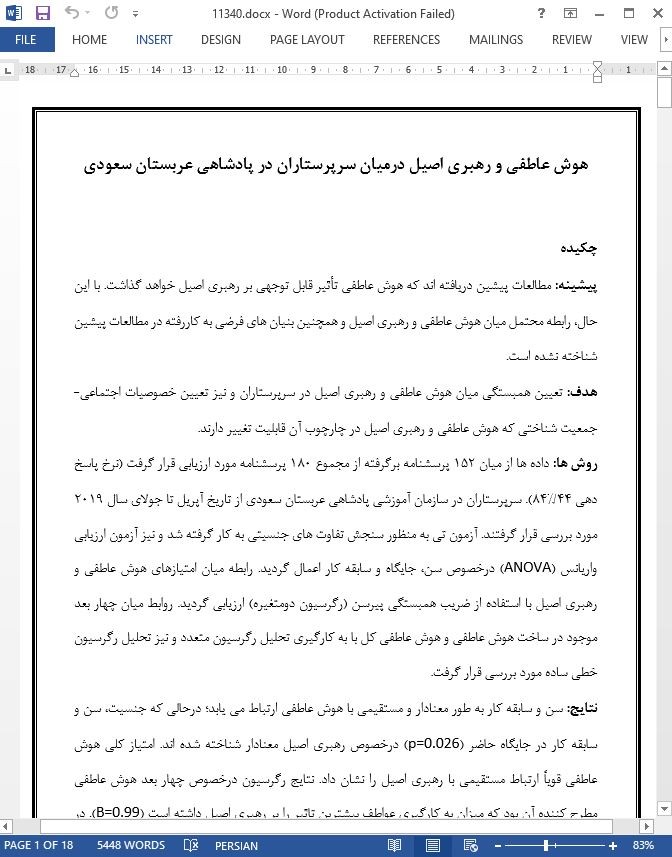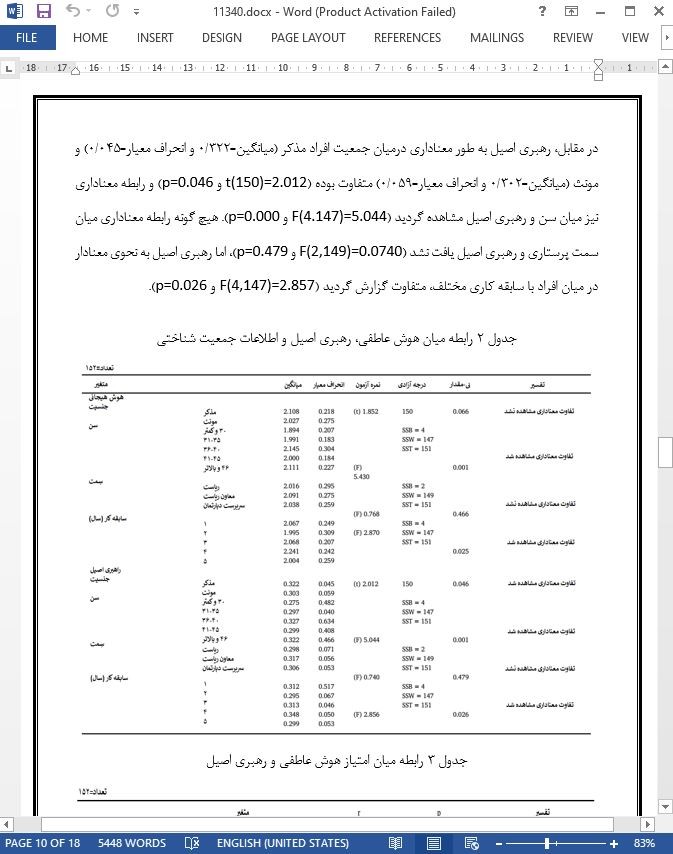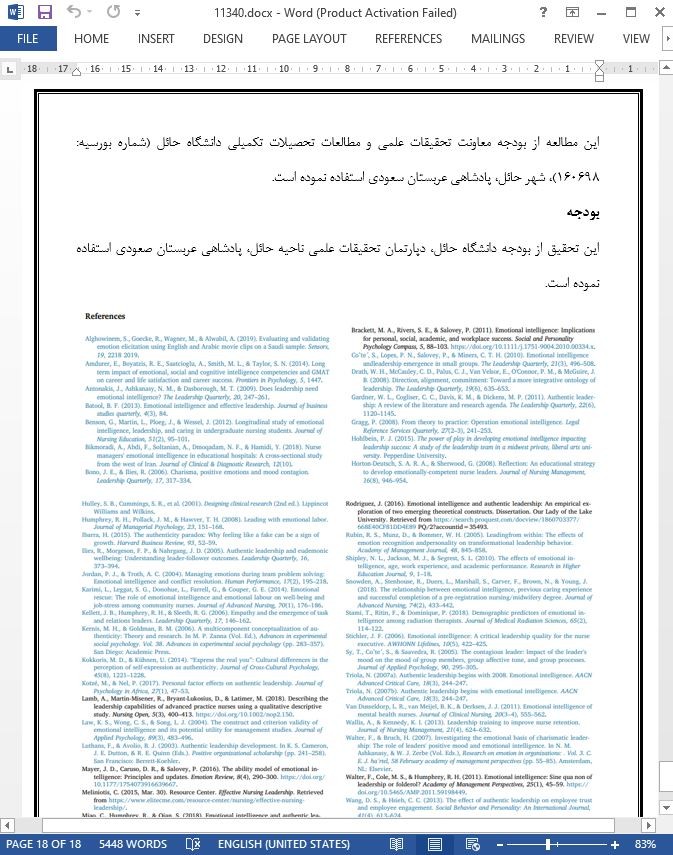
هوش عاطفی و رهبری اصیل درمیان سرپرستاران در پادشاهی عربستان سعودی
چکیده
پیشینه: مطالعات پیشین دریافته اند که هوش عاطفی تأثیر قابل توجهی بر رهبری اصیل خواهد گذاشت. با این حال، رابطه محتمل میان هوش عاطفی و رهبری اصیل و همچنین بنیان های فرضی به کاررفته در مطالعات پیشین شناخته نشده است.
هدف: تعیین همبستگی میان هوش عاطفی و رهبری اصیل در سرپرستاران و نیز تعیین خصوصیات اجتماعی-جمعیت شناختی که هوش عاطفی و رهبری اصیل در چارچوب آن قابلیت تغییر دارند.
روش ها: داده ها از میان 152 پرسشنامه برگرفته از مجموع 180 پرسشنامه مورد ارزیابی قرار گرفت (نرخ پاسخ دهی 44/84%). سرپرستاران در سازمان آموزشی پادشاهی عربستان سعودی از تاریخ آپریل تا جولای سال 2019 مورد بررسی قرار گرفتند. آزمون تی به منظور سنجش تفاوت های جنسیتی به کار گرفته شد و نیز آزمون ارزیابی واریانس (ANOVA) درخصوص سن، جایگاه و سابقه کار اعمال گردید. رابطه میان امتیازهای هوش عاطفی و رهبری اصیل با استفاده از ضریب همبستگی پیرسن (رگرسیون دومتغیره) ارزیابی گردید. روابط میان چهار بعد موجود در ساخت هوش عاطفی و هوش عاطفی کل با به کارگیری تحلیل رگرسیون متعدد و نیز تحلیل رگرسیون خطی ساده مورد بررسی قرار گرفت.
نتایج: سن و سابقه کار به طور معنادار و مستقیمی با هوش عاطفی ارتباط می یابد؛ درحالی که جنسیت، سن و سابقه کار در جایگاه حاضر (p=0.026) درخصوص رهبری اصیل معنادار شناخته شده اند. امتیاز کلی هوش عاطفی قویاً ارتباط مستقیمی با رهبری اصیل را نشان داد. نتایج رگرسیون درخصوص چهار بعد هوش عاطفی مطرح کننده آن بود که میزان به کارگیری عواطف بیشترین تاثیر را بر رهبری اصیل داشته است (B=0.99). در درجه بعدی، سنجش عواطف فرد (B=0.70) و سنجش عواطف دیگران (B=0.69) قرار می گیرند. تحلیل رگرسیون ساده بیانگر آن بود که به ازای هر واحد افزایش در امتیاز کلی هوش عاطفی، امتیاز رهبری اصیل به میزان 086/0 افزایش می یابد.
جمع بندی: سن و سابقه کار عوامل تعیین کننده ای در توضیح گوناگونی در هوش عاطفی در نظر گرفته شده اند؛ این در حالی است که جنسیت، سن و سابقه کار در جایگاه حاضر درخصوص توضیح گوناگونی در رهبری اصیل، معنادار بوده اند. به کارگیری عواطف بیشترین تاثیر را بر رهبری اصیل گذاشته و ابعاد هوش عاطفی که میزان نظارت عواطف را اندازه گیری می نماید، تاثیر قابل توجهی بر روی رهبری اصیل نداشته است.
جمع بندی
در نمونه ای از سرپرستاران شاغل در سازمان های آموزشی، به کارگیری هوش عاطفی به طور بخصوص در همراهی با رهبری اصیل شناخته شد که ممکن است پیامدهای سازمانی را بهبود بخشد. میزان به کارگیری هوش عاطفی منوط به سن و سابقه شغلی بوده، درحالی که تفاوت های موجود در رهبری اصیل از طریق تفاوت های جنسیتی، سن و سابقه شغلی قابل توضیح است.
Abstract
Background Previous studies have found that emotional intelligence has a remarkable influence on authentic leadership. However, the conceivable relationship between emotional intelligence and authentic leadership was unclear, as were the hypothetical bases used in previous studies.
Purpose To determine the correlation between emotional intelligence and authentic leadership of the nursing leaders and the socio-demographic characteristics by which emotional intelligence and authentic leadership vary.
Methods Data derived from 152 of the distributed 180 questionnaires were analyzed (84.44% response rate). Nurse leaders in the academy of the Kingdom of Saudi Arabia were assessed from April to July of 2019. t-Tests were used to test gender differences, while the Analysis of variance (ANOVA) tests were employed for age, position, and years of experience. The relationship between the emotional intelligence and authentic leadership scores was analyzed using Pearson's correlation coefficients (bivariate r). The relationships of the four dimensions in the emotional intelligence construct and overall emotional intelligence were assessed using multiple regression analysis and simple linear regression analysis.
Results Age and years of experience significantly and positively related to emotional intelligence, whereas gender, age, and years of experience in the current position (p = 0.026) were significant regarding authentic leadership. The emotional intelligence total score strongly and positively related to authentic leadership. The regression results on the four emotional intelligence dimensions indicated that the extent of using emotions had the strongest influence on authentic leadership (B = 0.99) followed by appraisal of one's emotions (B = 0.70) and appraisal of others' emotions (B = 0.69). The simple regression analysis indicated that, for every one-point increase in total emotional intelligence score, authentic leadership score increased by 0.086.
Conclusion Age and years of experience were significant factors explaining variation in emotional intelligence, whereas gender, age, and years of experience in the current position were significant for explaining variation in authentic leadership. Using emotions was the strongest influence on authentic leadership, and the emotional intelligence dimension measuring regulation of emotion had no significant influence on authentic leadership.
Conclusion
In a sample of nursing leaders in academia, using emotional intelligence was particularly associated with authentic leadership, which might improve organizational outcomes. The extent to which emotional intelligence was used was influenced by age and years of experience, whereas variation in authentic leadership differed by gender, age, and years of experience.
چکیده
مقدمه
مروری بر منابع
روش ها
طراحی
شرکت کنندگان
جمع آوری داده
پرسش نامه ها
ملاحظات اخلاقی
تحلیل داده ها
نتایج
بحث
محدودیت ها
استنتاجات در خصوص تحصیلات پرستاری
تحقیقات آتی
جمع بندی
ABSTRACT
Introduction
Review of the literature
Methods
Design
Participants
Data collection
Questionnaires
Ethical considerations
Data analysis
Results
Discussion
Limitation
Implication for nursing education
Future research
Conclusion
- اصل مقاله انگلیسی با فرمت ورد (word) با قابلیت ویرایش
- ترجمه فارسی مقاله با فرمت ورد (word) با قابلیت ویرایش، بدون آرم سایت ای ترجمه
- ترجمه فارسی مقاله با فرمت pdf، بدون آرم سایت ای ترجمه



